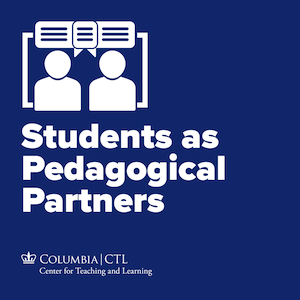Ungrading: Reimagining Assessment of Student Learning
 Ungrading, broadly defined, is an assessment practice that moves beyond the conventional grading practices and intentionally focuses more on learning and less on grades (Blum & Kohn, 2020). It critically views grades as a systemic practice and offers alternative ways to reimagine how student learning can be assessed more equitably.
Ungrading, broadly defined, is an assessment practice that moves beyond the conventional grading practices and intentionally focuses more on learning and less on grades (Blum & Kohn, 2020). It critically views grades as a systemic practice and offers alternative ways to reimagine how student learning can be assessed more equitably.
In Fall 2022, we asked five undergraduate students (consultants on the Students as Pedagogical Partners initiative) to reflect on their experiences with assessment in Columbia classrooms and the learning benefits of ungrading. Below, our students share their perspectives on how ungrading can serve as a valuable assessment strategy to support student learning. Themes that emerged include autonomy, agency, and transparency.
 Involve students in the assessment process: “When I’m given the opportunities to help design a rubric that will be used to evaluate my work or more creative freedom on the subject matter for a specific assignment, I feel more in control of my learning and more confident in my work.” – Emily Glover, Columbia College (Major: Neuroscience)
Involve students in the assessment process: “When I’m given the opportunities to help design a rubric that will be used to evaluate my work or more creative freedom on the subject matter for a specific assignment, I feel more in control of my learning and more confident in my work.” – Emily Glover, Columbia College (Major: Neuroscience)

Encourage learner agency: “By partnering in the assessment process, my professor provided me with a level of autonomy I’ve never experienced in the classroom. My involvement in the assessment process inspired me to challenge myself and to produce my best work.” – Kyle Gordon, General Studies (Major: Political Science)

Provide multiple ways to demonstrate learning: “Inclusion and involvement in the assessment process amplifies my motivation to pursue the learning goals I set for myself.” – Jesper Norgaard, General Studies (Major: Psychology)

Invite student feedback: “In this experience, I saw that my professor cared about my individual learning and was willing to take steps to improve my experience in the class. (…) the survey shifted the focus from grades to individual learning experiences in the classroom.” – Maryam Pate, Columbia College (Majors: Economics & Computer Science)

Redefine rigor with a focus on learning: “My professor’s transparency and communication at the beginning of the course allowed me to shift my focus from grades to learning.” – Olivia Schmitt, School of Engineering and Applied Science (Major: Computer Science)
Involve students in the assessment process.
Emily Glover, Columbia College (Major: Neuroscience)
 There have been many moments in my academic career when I have felt worried or even apprehensive about assignments because the prompt was vague or no rubric was handed out. I have felt this especially in college as each professor grades differently and expects different things. I’ve found myself not only having to learn the course material, but also how my professors grade and what they really find important through a sort of “trial-and-error” process that can negatively impact my grade. In classes where my grade is determined by a handful of assignments, I can’t really afford to “sacrifice” a grade to determine my instructor’s preferences. This leads to anxiety when completing assignments because I don’t know the specifics of what my instructor is looking for. Ungrading tactics where the students help create the rubric or even give suggestions on what to incorporate into the prompt helps ease this anxiety because it takes the guesswork out of things. I know what I’m going to be graded on because it was discussed in class and I may have helped decide it. Additionally, my professors were transparent about their expectations and took class time to discuss the assessment in detail.
There have been many moments in my academic career when I have felt worried or even apprehensive about assignments because the prompt was vague or no rubric was handed out. I have felt this especially in college as each professor grades differently and expects different things. I’ve found myself not only having to learn the course material, but also how my professors grade and what they really find important through a sort of “trial-and-error” process that can negatively impact my grade. In classes where my grade is determined by a handful of assignments, I can’t really afford to “sacrifice” a grade to determine my instructor’s preferences. This leads to anxiety when completing assignments because I don’t know the specifics of what my instructor is looking for. Ungrading tactics where the students help create the rubric or even give suggestions on what to incorporate into the prompt helps ease this anxiety because it takes the guesswork out of things. I know what I’m going to be graded on because it was discussed in class and I may have helped decide it. Additionally, my professors were transparent about their expectations and took class time to discuss the assessment in detail.
These same tactics also help me feel more autonomous as a student and more comfortable in practicing academic agency. When I’m given the opportunities to help design a rubric that will be used to evaluate my work or more creative freedom on the subject matter for a specific assignment, I feel more in control of my learning and more confident in my work. This makes learning more engaging and rewarding for me because I am involved in the assessment process. Ungrading practices have required me to unlearn the systemic grading system that has been ingrained in me for over a decade while pushing myself to participate in what at first feels like unconventional methods. My professors are the key to successful ungrading. Having my professor there to work closely with the class and facilitate transparent discussion while encouraging us to contribute to and provide feedback on the assessment practices is integral to creating an environment where I feel supported and prepared to participate in ungrading.
I have become a better student as a result of the ungrading practices that I have experienced at Columbia. I still remember being a first-year in my Literature Humanities class and dealing with the uncertainty of the pandemic. I felt like I had lost all motivation and confidence in myself as a student. Instead of giving us a virtual, 3-hour written final exam, my professor decided to do a 30-minute exit interview to discuss our final papers and the class overall. At first, it felt like the end of the world to have to talk to my professor one on one about my work, but this just made me push myself even harder to write an amazing paper. During the interview my professor asked the most inquisitive questions and really challenged me to push even further on my ideas and claims. By the end of the interview, I realized how much I had actually learned that year and felt much more confident in my ability to make a claim and defend it. I walked away feeling more academically enriched and more confident in my abilities.
Encourage learner agency.
Kyle Gordon, General Studies (Major: Political Science)
As a learner, when I feel in control of my education, I’m more invested in the outcome. An example of such is when I had a say in the assessment process for one of my courses at Columbia.
In Contemporary Civilization, for our final assignment, we were to write an essay on a reading of our choice from that semester. I felt emboldened to ask my professor if I could submit a “critical-creative annotation” (CCA) instead of an essay. A critical-creative annotation is a visual demonstration of a student’s analysis. It fuses elements of close reading, interpretation, contextualization, etc., through different illustrations and annotations. This type of assignment gives students considerable latitude by allowing them to select two pages from any reading assigned throughout the semester and create a creative annotation. To my surprise, my professor enthusiastically agreed. The project provided me the ability to approach the material from my unique perspective and integrate my personal interests that I’m passionate for. To this day, it was the most engaging assignment.
By partnering in the assessment process, my professor provided me with a level of autonomy I’ve never experienced in the classroom. My involvement in the assessment process inspired me to challenge myself and to produce my best work—I felt I owed it to my professor. In other words, I was invested in the outcome.
As a student with ADD, prioritizing my time is chief to my academic success. However, this can be increasingly difficult based upon courses’ grading distribution. In the past, I’ve taken courses where two assignments comprised 60% of my final grade. For a week or two leading up to an assignment’s deadline, I unfortunately neglected readings because, pragmatically, an assignment that impacts my grade takes precedence. (Even if the material I’m overlooking will later be tested on, I tell myself I’ll get to it another time—consequently, creating a compound effect.) In effect, I often find myself disengaged in the classroom within that span of time, namely remaining silent when questions are asked because I’m ‘unprepared.’
A practice that would benefit me as a student is breaking assignments into smaller ones. For instance, if the assignment is an essay, the essay could be made up of three smaller pieces. First, a thesis and an outline. Second, the body, with topic sentences emphasized. Third, the final essay. Even if the final essay determines 90% of the overall assignment grade, and the other elements, together, account for the other 10%, I would feel less angst because the instructor feedback along the way would provide me with a better understanding of the assignment and what its expectations are. In doing so, I’d remain engaged because I’d have already done a large chunk of the work throughout the first two steps, thus giving me the time to interact with course material leading up to the assignment’s due date.
 Provide multiple ways to demonstrate learning.
Provide multiple ways to demonstrate learning.
Jesper Norgaard, General Studies (Major: Psychology)
One particular ungrading practice I find helpful is providing multiple ways to demonstrate my learning with minimal grading. In two previous courses I have taken at Columbia, my professors created great learning experiences with group discussion opportunities and small weekly assignments. They focused more on the learning we were expected to achieve than the grades in the course.
In a literature course, my professor created weekly assignments that we needed to sign up for within the first two weeks of the semester. Each student would write ten discussion questions for a 30-minute segment of class they would lead and share the questions with the professor beforehand. By crafting my own discussion questions, I was able to explore and understand course topics on a deeper level, and it made me work harder. There was also less uncertainty of the relevance or importance of the discussion questions because I was part of creating them, and I understood why they were necessary to ask.
In a cognitive psychology course, at the end of each class session, my professor gave five questions relating to course content for students to answer together (in small groups of 4-5) in a few sentences and synthesize what we had just learned during class. This helped me improve my comprehension, retrieval, and long term storage of the material, and it encouraged learning from one another in a collaborative environment.
Prior to taking exams, I have found it helpful to receive incremental, regular feedback on my progress. To keep my focus on learning, I would benefit from assignments designed to prepare me for exams that are graded with a check-mark system where instructors give feedback, such as “Great understanding, continue your present effort (✓+),” “Some extra attention is needed in a certain area – come to the next office hour (✓),” and “There are things you may have misunderstood in the lessons – come to the next few office hours (✓-)” (as suggested by Jenny Davidson from the podcast: Dead Ideas in Grading, Season 1, Episode 5).
Combining that feedback with my own progress evaluation would help me gauge if my time is well spent. With feedback, I could validate my study methods or adjust them in time to make appropriate improvements throughout the semester. I would hold more personal responsibility and control for my ultimate success in the course, and focusing more on retention and mastery than letter grades would help reduce stress and anxiety about the high-stakes exams.
Inclusion and involvement in the assessment process amplifies my motivation to pursue the learning goals I set for myself. When the instructor explains the course structure early in the semester, it offers me the opportunity to prepare myself for later assignments. I can then develop a sense of agency in assessing my own learning progress which leads to greater participation and appreciation of what I learn.
Invite student feedback on assessment.
Maryam Pate, Columbia College (Majors: Economics & Computer Science)
As a student, I find that ungrading benefits me by creating room for me and my professor to engage in a partnership in a way that standard methods of grading typically do not allow for, placing the learning journey in the hands of both the professor and student.
In an econometrics course, I experienced ungrading through the intentional use of a class survey. As the midterm neared, our professor distributed a survey to the class that asked us to rate and describe our performance in the class, its difficulty, our concerns about the midterm, and make any other comments. In response to this feedback, our professor decided on new class measures, and presented them to us along with the results of the survey. One topic brought up in the survey was how lecture time should be allocated; my classmates and I voted in favor of having practice problems at the start and end of the lecture. As someone who struggles to remain focused in long lectures, I have really benefited from the variation in the lecture structure as it keeps me more engaged – overall, more room was created for the differences and varying needs of all students in a way that enriched the course experience.
The survey also opened up a discussion on allowing students to bring note sheets to the midterm exam; as someone without a very strong background in statistics, a prerequisite for the course, I knew my studying would partly consist of reviewing materials that preceded the course. We were each allowed to bring in note sheets with whatever information we felt would be useful to us, and I was able to reflect on what I did and did not know and was given the agency to supplement this knowledge; my classmates’ respective note sheets were reflections of our individual understandings of our weaknesses or needs in the class. I see this as one example of advancing towards equity in the classroom because it abandons the assumption that students enter the classroom with equal levels of prior knowledge. By allowing note sheets, the professor lessened the extent to which students with different backgrounds would be negatively affected by the setup of traditional assessment methods; the focus was reshifted to each student’s different starting points in their learning process. In this experience, I saw that my professor cared about my individual learning and was willing to take steps to improve my experience in the class. I became incredibly more invested in my learning by being a part of this partnership because I clearly knew and was reminded that the ultimate goal was to achieve meaningful learning.
Although my professor never used the term ungrading, the way he used the survey shifted the focus from grades to individual learning experiences in the classroom. Ungrading can facilitate engagement, participation, accountability, and agency that may have otherwise not been possible or present. Some of the most meaningful aspects of learning for me are the relationships that I build with my professors and engaging in meaningful conversations with peers.
While grades remove me from such connectedness to the aspects of learning I most enjoy, ungrading invites me back to actively and consistently engage in my learning. The partnerships that ungrading yields are defined by the student’s preparation to discuss their individual progress and goals and the professor’s willingness to adapt and communicate the learning goals they have outlined for students. These partnerships hold both parties accountable for their roles in the learning process and I believe that they are where effective learning and equitable assessment can be born.
Redefine rigor with a focus on learning.
Olivia Schmitt, School of Engineering and Applied Science (Major: Computer Science) 
For a student at a top university like Columbia, the importance of grades has been instilled since high school. As a woman of color recruited to run track and field, I found myself keeping my valedictorian title from high school close to my chest as I started my path towards a Computer Science (CS) major in male-dominated classes. Upon returning to in-person classes in Fall 2021, my CS course that semester was dubbed one of the hardest courses in the major. This type of course is what one might define as “rigorous.” It’s exceedingly demanding in workload and exams. It holds all enrolled students to the same strict standards, and it uses assessments that are designed to have low averages. The class keeps students in a fight against failure in order to learn.
My professor knew this preconception and addressed it at the start of the course. He reinforced the difficulty of the course, but he emphasized that it will be difficult because it will challenge us to not simply regurgitate what we learn in lectures, but we must utilize our understanding of course content to solve more complex problems. The exams were meant to present problems that synthesized different components from class and challenge us to apply a further understanding.
With this in mind, I watched recorded lectures twice if I didn’t fully understand, attended all recitations, and completed every practice problem available to me to prepare for my first in-person exam for which I received a below average score. With my first failed exam ever in my education, the imposter syndrome came full force. Defeated and burned out, I listened to the professor’s encouragement thereafter that a bad exam score doesn’t equate to failure.
I hoped to feel solidarity with other students struggling, blaming our averages on tests that were made to be difficult. The TAs were comforting in this respect, reiterating the professor’s words. Before and after each exam, the TAs would hold recitation review sessions and work through each practice exam. The recitations connected me to other struggling students and provided support on programming homework and practice exams. It allowed a community to form amongst the students and lower the feelings of competitiveness by helping us push through these challenges together.
As I began reviewing the class material in preparation for the final, I realized how much I had learned over the semester. As the professor had outlined, the work I was putting in was paying off. It may not have been easy to see that on the strenuous exams, but the exams were not a full representation of my learning. This shift in understanding changed the way I studied; along with going through every resource provided, I concentrated a lot of my time in understanding concepts I didn’t fully understand.
The anxiety that came with each of the three exams never dampened as the semester went on. That’s an unfortunate reality of timed exams. Yet, at the end of the course, I realized I had put less emphasis on my exam score when determining my success in the course. Even more, I found that my coding skills and knowledge in computer science improved tremendously. The grade didn’t matter to me at this point. I learned how to think about problems with a CS mind.
My professor’s transparency and communication at the beginning of the course allowed me to shift my focus from grades to learning. Throughout the semester, he offered a system of recitations and the sense of community formed thereafter. After reflecting on the course, I realized how much I gained from it. It was rigorous, but not in the way I had originally assumed. It was not the difficult exams that made the course rigorous. In fact, the course allowed me to redefine what rigor is supposed to mean. It allowed me to stop prioritizing my final grade and focus on learning the material. Course content was not easy, but my peers and I were able to push through. This ongoing engagement was curated by the teachers and TAs who provided a scaffolding of support throughout the semester. This encouraged and challenged me to develop my coding skills and engage with complex problems that created a truly rigorous but rewarding learning process for me.
A course doesn’t need to put up a wall between the students and professor to be rigorous. In fact, my experience proved that providing support allows for students’ success. I felt like I grew academically, and more importantly, I felt like I finally belonged to be at this institution. This course reminded me I was capable of success and redefined what it meant to learn at Columbia.
Resources
To learn more about rethinking your assessment methods, explore the following CTL resources:
- [On-demand resource] Assessing Equitably with All Learners in Mind
- [Podcast] Assessment For and As Learning with Jonathan Amiel and Aubrie Swan Sein (Season 2, Episode 1)
- [Podcast] Dead Ideas in Grading with Jenny Davidson (Season 1, Episode 5)
- [Podcast] Ungrading with Jesse Stommel (Season 2, Episode 2)
Reference
Blum, S. D., & Kohn, A. (2020). Ungrading: Why rating students undermines learning (and what to do instead). West Virginia University Press,.
Rigor and Assessment from the Student Point of View.
Dead Ideas in Teaching and Learning podcast, Season 5, Episode 7.
How can assessment motivate students to focus on learning as opposed to grades? Can it still be rigorous if it’s not high stakes exams?
Listen to Columbia undergraduate Student as Pedagogical Partners, Maryam Pate and Olivia Schmitt reflect on their experiences with different types of assessment and the impacts on their learning.